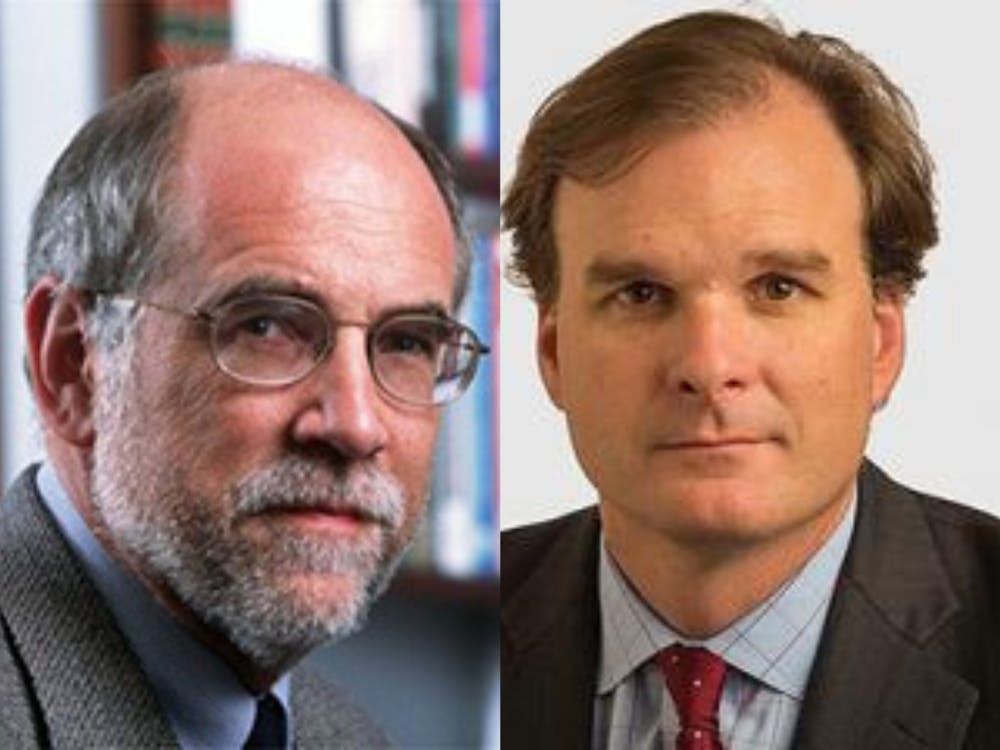Two Duke University professors are among 600 people serving on agency review teams to assist in the transition from the Trump administration to the Biden administration.
The Biden administration selected 80 professors to serve on the 600-person transition team. Among them, Christopher Schroeder, professor emeritus of law and public policy, is leading the Department of Justice review team. Robert Bonnie, executive in residence at the Nicholas Institute for Environmental Policy Solutions, is heading up the U.S. Department of Agriculture transition team.
Before volunteering for this role, Schroeder served as chief counsel to the Senate Judiciary Committee. During his time as counsel, he advised then-Senator Joe Biden on four Supreme Court nominations.
“Dozens of people can say that Sen. Biden and Vice President Biden has asked for their help at different times,” said Ted Kaufman, Biden’s longtime chief of staff, “but I don’t know a single person that can say they were brought in in this capacity more and for better use than [Schroeder].”
Schroeder also served as the acting assistant attorney general of the Office of Legal Counsel during Bill Clinton’s presidency, as well as assistant attorney general in the Department of Justice’s Office of Legal Policy in the Obama administration.
Schroeder has called his time in the Clinton administration “the highlight of [his] professional career, working with all those wonderful people on hard problems and thinking that [he was] doing something that was of some consequence.”
Schroeder and Bonnie were not available for interviews in time for publication.
Schroeder’s Duke colleague David Hoffman, professor of the practice in the Sanford School of Public Policy, wrote in an email that Schroeder is “a fantastic listener, which he uses to ask the right questions of the right people.”
“The [United States] is incredibly fortunate to have [Schroeder] leading the Department of Justice transition team. He has a diverse and deep set of expertise from his time in government and in academia that allow him to see many of the hardest issues from multiple perspectives,” Hoffman wrote. “Chris understands the issues and knows how to put the Department in the best position for success. His impact will be measured based on how well others take advantage of the position he puts them in, but he will give the Department the ability to focus on making progress from day one.”
Schroeder founded the Program in Public Law at Duke in 1998 and still teaches several courses.
Bonnie’s current work centers on conservation and environmental issues in rural America. Prior to his role at Duke, he served as the under secretary for Natural Resources and Environment during Obama’s second term.
As under secretary, Bonnie worked with the U.S. Forest Service and the Natural Resources Conservation Service on matters regarding natural resources. His projects included managing the 193 million-acre National Forest and Grassland System; implementing conservation programs on America’s farms, ranches and forests; and monitoring the climate crisis.
During Barack Obama’s first term as president, Bonnie took on the role of senior advisor to Secretary of Agriculture Tom Vilsack, advising Vilsack on the environment and climate change.
Tim Profeta, director of the Nicholas Institute for Environmental Policy Solutions, said that Bonnie first came to campus as a Rubenstein fellow several years ago. Profeta described this position as “a fellowship for high-level executives from other sectors to come to campus and share the knowledge and communicate with the Duke community.”
“To have [Bonnie] in this role is exciting for everybody at the Nicholas Institute, and they are thrilled that he is doing it and encouraging him. It is very consistent with our mission,” Profeta said.
Philip Karsting, former administrator of the USDA’s Foreign Agricultural Service under Obama, said in an interview with Southern Farm Network that Bonnie brings real-world agricultural experience to the team.
“Obviously, climate will be a big issue for discussion in the coming Congress, and if I were a farmer, I would want Robert Bonnie in the room when those topics come up precisely because he is a bridge-builder and not a flamethrower,” Karsting said.
“I think he will make sure that President Biden’s priorities get activated quickly within the department,” Profeta said. “And from my perspective, I think he will be pursuing some of the issues that he was passionate about wanting to see at Duke: working on increasing rural investment, increasing acceptance of rural communities, the need to act on environmental issues, and particularly climate change.”
Get The Chronicle straight to your inbox
Signup for our weekly newsletter. Cancel at any time.

Kathryn Thomas is a Trinity junior and new reporter coordinator of The Chronicle's 119th volume. She was previously news editor for Volume 118.

